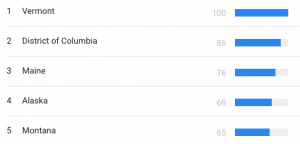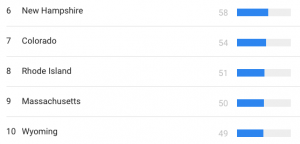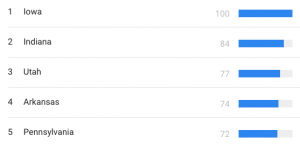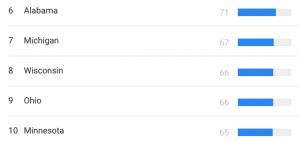Keyword research is a digital marketer’s bread and butter and it can be a fun experiment to play around with even if you don’t work in the industry.
Last Keyword Watch we looked to see if there was a relation between “new homes” and “new car” searches. We were able to hypothesize theories about how the time of year correlates to these searches and make assumptions based on that.
For our second round of Keyword Watch, we wanted to dive deeper into something slightly more controversial: climate change.
Climate change, global warming, and the rest of us
For decades, scientists have been researching and studying the earth’s climate and have come to some alarming conclusions. While the scientific field is in agreement that the climate is changing, mostly due to human consumption, there is an outspoken group of people who believe that these studies have been greatly exaggerated.
In the United States, there is a general assumption that those who believe in manmade climate change (i.e. humans are causing this extreme weather change, as opposed to it being earth’s natural cycle) tend to fall under the democrat or liberal ideology, whereas those who believe that this phenomenon is a natural event tend to be republican or conservative. Of course, this doesn’t account for every person in each political party, but can be thought of instead as a general rule of thumb.
We wanted to test those assumptions and more so we turned to Google Trends to help us out.
Climate Change
First, we searched for “climate change”. Thanks to the movie, An Inconvenient Truth and outdated misconceptions, the term “global warming” has been in vogue when talking about the planet’s changing climate; however, due to the misleading term (the earth is heating up, but it’s also experiencing extreme temperature swings, including intense cold temperatures), the scientific community now uses the term “climate change” as a more accurate assessment.
Below is a graph of the the popularity of the search term “climate change” since 2004.


Something of interest is that searches increase in January and February. This could be users who are searching about climate change in a particularly warm or cold winter.
Also of note is that in election years, both midterm and presidential, the searches go up, most likely due to the fact that climate change is a hot button issue for voters and candidates.
Below are the top 10 states that most commonly searched for climate change over a 15 year period.


It comes as no surprise that Washington DC is a top searcher, since climate change is a political hot topic.
With the exception of Montana, Alaska, and Wyoming, the leftover states in the top 10 all have pro-democrat leanings, backing up the claim that the term “climate change” is a more progressive search. Those states plus Alaska also stand to be at major risk in the future. Coastal states and Alaska have a major risk of devastating flooding if temperatures rise too much in the Arctic.
Global warming
Now, let’s look at “global warming” queries since 2004.


And, to compare, below you’ll see a chart with both “global warming” (red) and “climate change” (blue) queries.


You can see that until around late 2014, global warming was the choice search term. The peak for global warming searches occurred in April 2007, when the documentary, The Great Global Warming Swindle was shown at the Cannes Film Festival. This documentary sought to debunk climate change and was met with high criticism.
Another note: The movie An Inconvenient Truth, made famous by ex-Vice-President Al Gore, was released in May, 2006, but didn’t cause a major uptick in searches. The searches increased steadily from August 2006, with just one dip until April 2007.
Finally, take a look at the top 10 US states who search for “is global warming real”:


It’s interesting that almost all of the states in the top 10 for this query are republican-leaning states or swing states in every election. We can hypothesize that voters in those swing states are searching for divisive issues amongst candidates.
To help back up this hypothesis, we can see that searches start building momentum in October every couple of years, which would correlate with the US election cycle. However, it’s important to mention that we’ve seen “climate change” and “global warming” generally increase around this time of year anyway, most likely due to warmer or colder than average winters.


What does it mean for search when there’s an extreme winter?
The last concept that we experimented with was do searches for climate change or global warming increase when there is an anomaly with extreme summer or winter weather? This led to some muddled results, because 14 of the last 15 years have been the warmest on record. However, there have been many (cold) winter extremes in the US over the last decade.


This chart shows that the most popular search for global warming since 2010 was at the beginning of that year. It also was one of the most extreme winters in recent years. Accuweather says that “The winter of 2009-2010 was defined by snow storms of historic proportions and record-breaking cold.” This leads us to believe that when there are anomalies of colder winters or milder summers, users search for “global warming” wondering if it’s still something that they should be concerned with.
How can we use this information?
Looking for patterns in keywords and what users are searching opens up a new world for digital marketers. When you start to visualize these patterns, it becomes easier to stay ahead of what’s trending and how to capitalize on what users will be searching for.
But, if you’re not in the marketing business, this is still an educational tool to play around with. You’ll start to get a better grasp at how concepts fit together and how that affects us.
Finally, for more facts and statistics about our changing climate, visit the EPA website here.